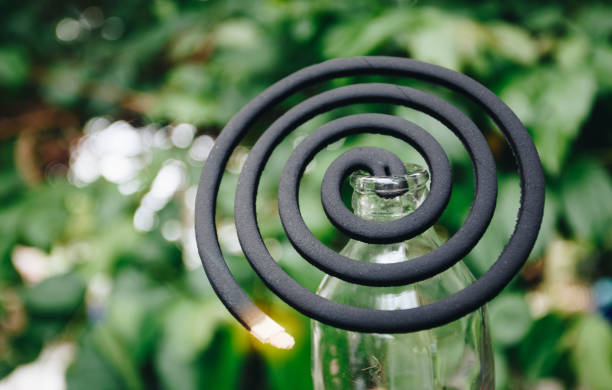Mosquito coils are a type of mosquito-repelling incense that are usually made using dried paste of pyrethrum powder. The shape is typically spiral and the coil is held at the center of the spiral.
Mosquito coils are commonly burned both indoors and outdoors in many areas. They are made up of insecticides/repellants, organic fillers that can smolder, binders, and additives like synergists, dyes, and fungicides.
In low-income nations, mosquito coils are the most popular anti-mosquito product since they are affordable and widely available. In many homes in Asia, South America, and Africa, burning mosquito coils is a frequent indoor practice.
A sizable portion of the populace in developing nations, including ours, continues to use mosquito coils daily to prevent mosquito bites. However, our health will suffer if exposed to this form of chemical smoke over an extended period.
Mosquito coils kill or repel mosquitos for approximately 8 hours without the use of a flame. Although coils are advised for use outdoors or in semi-enclosed patios and porches, they are frequently used overnight during sleeping hours, where elevated exposure may occur, and epidemiological studies have shown that long-term exposure to mosquito coils can cause a wide range of health issues.
Health implications of prolonged exposure to mosquito coil smoke
Numerous studies have shown that the various pollutants released during the burning of mosquito coils, including volatile organic compounds, high levels of particulates with an aerodynamic diameter of fewer than 2.5 micrometers, and polycyclic aromatic hydrocarbons, are strongly linked to human health problems.
Researchers have found that the gas phase of mosquito coil smoke contains carbonyl compounds, including formaldehyde and acetaldehyde, that can produce irritating solid effects on the upper part of the respiratory tract. These small particles, metal fumes, and vapors in mosquito coils may reach the alveolar region of the lungs.
Furthermore, it was shown that burning a mosquito coil releases pollutants into the air roughly equivalent to smoking 75–137 cigarettes, which has far-reaching effects on public health.
Below are some of the various possible implications and conditions that can be seen as a result of the regular burning of mosquito coils.
May cause lung cancer
The carcinogens in mosquito coils can damage your lungs and increase your risk of developing lung cancer.
A chemical called bis(chloromethyl)ether is released in the burning of mosquito coils, and that is concerning, because bis(chloromethyl)ether is an extremely potent lung carcinogen.
Could cause headaches
The substances in the coils can cause headaches. The majority of people may experience headaches after burning a coil.
A significant percentage of people have reported that they had headaches after using mosquito coils.
Stimulates asthma and COPD
Those with asthma or chronic obstructive pulmonary disease (COPD) should exercise caution. Burning mosquito coils can cause asthma attacks, breathing problems, and coughing.
May cause allergies and rashes on the skin
Metals in the coils can cause rashes and allergies. They may even cause eye irritation or allergies. In high enough concentrations, the chemicals can cause serious illnesses such as coughing, wheezing, constant sneezing, asthma, sore throat, nausea and dizziness, respiratory irritation, and even suffocation.
Potential harmful effects on children
Besides breathing implications and allergies, if the coils are kept close to babies or small children, they can cause severe burns. Furthermore, the coils can be accidentally ingested by babies. To ensure your child’s safety, it is crucial that you avoid using burning coils at home.
Safety measures you can implement while using mosquito coils:
Although employing coils inside with the windows closed is not advised, having them smolder outside isn’t much of a problem.
The best time to use a mosquito coil is before going to bed, in the evening, as this is when mosquitoes are most active, and it is easiest to drive them outside.
There are, however, other options if you are concerned about health risks or want something you can use indoors:
- Electric vaporizers
- Mosquito repellent spray
- Natural repellents such as Citronella Lemongrass, Peppermint Basil, etc.
Conclusion
Our health, especially the respiratory system, may suffer from prolonged exposure to mosquito coil smoke. Consequently, using mosquito coils for an extended period is not the best way to manage mosquitoes.




